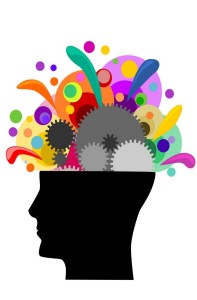One Essential for Cultivating Emotional Intelligence
 Daniel Goleman’s seminal work, Emotional Intelligence has made universally recognizable the acronyms EI and EQ (referring to Emotional Intelligence and Emotional Quotient). We all seem to have an intuitive grasp of what these terms mean. When referring to a coworker, boss, or a potential employ, we nod our heads approvingly when someone tells us, “She is one of those people with a high EQ” or shake them in sympathy when we hear, “It’s just that he is completely un self-aware, you know, low EQ.” This capacity of individuals to recognize their own, and other people’s emotions, to discriminate between different feelings and label them appropriately, and to use that emotional information to guide thinking and behavior is at the core of leadership competency.
Daniel Goleman’s seminal work, Emotional Intelligence has made universally recognizable the acronyms EI and EQ (referring to Emotional Intelligence and Emotional Quotient). We all seem to have an intuitive grasp of what these terms mean. When referring to a coworker, boss, or a potential employ, we nod our heads approvingly when someone tells us, “She is one of those people with a high EQ” or shake them in sympathy when we hear, “It’s just that he is completely un self-aware, you know, low EQ.” This capacity of individuals to recognize their own, and other people’s emotions, to discriminate between different feelings and label them appropriately, and to use that emotional information to guide thinking and behavior is at the core of leadership competency.
Today’s inspiration explores the four competencies of EI: self-awareness, emotional self-regulation, social awareness, and relationship management, and their connection with the role of mindfulness:
“By consistently practicing mindfulness, not only do individuals develop deeper self-awareness, one of the major tenets of EI, they also develop greater insight into others, into human nature and along with an easing of ego-based concerns, mindfulness encourages a more compassionate concern for others.” Dr. Richie Davidson, neuroscientist, author of The Emotional Life of your Brain and founder of the Center for Healthy Minds at UWISC- Madison.
 The creator of Google’s Search Inside Yourself program, Chade-Meng Tan, also makes strong the link between EI and mindfulness. Tan wanted to help people find a way to align mindfulness practice with what they wanted to achieve in life, so they can create peace and happiness in themselves, and at the same time create world peace.” This was predicated on the belief that all empathy and kindness come from cultivating a sense of inner calm, which can be achieved through mindfulness. For Tan the key moment came while reading Goleman’s Emotional Intelligence, “I had found my vehicle for aligning meditation with real life, and that vehicle is emotional intelligence. A very good way (and I suspect the only way) to truly develop EI is with contemplative practices starting with Mindfulness Meditation.”
The creator of Google’s Search Inside Yourself program, Chade-Meng Tan, also makes strong the link between EI and mindfulness. Tan wanted to help people find a way to align mindfulness practice with what they wanted to achieve in life, so they can create peace and happiness in themselves, and at the same time create world peace.” This was predicated on the belief that all empathy and kindness come from cultivating a sense of inner calm, which can be achieved through mindfulness. For Tan the key moment came while reading Goleman’s Emotional Intelligence, “I had found my vehicle for aligning meditation with real life, and that vehicle is emotional intelligence. A very good way (and I suspect the only way) to truly develop EI is with contemplative practices starting with Mindfulness Meditation.”
We begin training emotional intelligence by training attention…a strong, stable and perceptive attention affords you calmness and clarity, the foundation on which emotional intelligence is built. Mindfulness is a quality of awareness that is strong both in clarity and stability. This allows us to perceive emotion with high vividness and resolution. We can then begin to respond, in the best possible way, to ourselves, to other people and the changing situations of our lives. Being aware and deliberate sure beats reacting in ways that are habitual but don’t really serve us much. In fact, developing emotional intelligence is an ultimately practical endeavor.
 And the research is compelling. Research at Harvard and Northeastern have shown that participants in mindfulness training are better able to articulate their emotions and score higher on overall empathy scales than the placebo. Their conclusion: people who regularly practice mindful meditation can more easily develop the ability to detect and understand the emotions of others. And this greater empathy is circular. The continually flowing loop is from self to others back to self. Knowing yourself lies at the core of EQ, and that the best mental app for this can be found in the mind-training method called mindfulness and meditations that strengthen it.
And the research is compelling. Research at Harvard and Northeastern have shown that participants in mindfulness training are better able to articulate their emotions and score higher on overall empathy scales than the placebo. Their conclusion: people who regularly practice mindful meditation can more easily develop the ability to detect and understand the emotions of others. And this greater empathy is circular. The continually flowing loop is from self to others back to self. Knowing yourself lies at the core of EQ, and that the best mental app for this can be found in the mind-training method called mindfulness and meditations that strengthen it.
To enhance your EQ, start with a link to a Three Minute Breathing Space Practice with Zindel Segal, PhD, co-founder of MBCT (Mindfulness-Based Cognitive Therapy):


 “We do not learn from experience…we learn from reflecting on experience.”- John Dewey
“We do not learn from experience…we learn from reflecting on experience.”- John Dewey

 There are lots of ways in which we as human beings can get caught under the vast net of stress in our lives. We oftentimes find ourselves feeling trapped by difficult circumstances and the attending feelings and thoughts that arise from them. All of this can create a sense of being overwhelmed and life at times can appear unmanageable. We then struggle and we suffer. Often times the root cause no longer exists but our coping strategies themselves have become problematic.
There are lots of ways in which we as human beings can get caught under the vast net of stress in our lives. We oftentimes find ourselves feeling trapped by difficult circumstances and the attending feelings and thoughts that arise from them. All of this can create a sense of being overwhelmed and life at times can appear unmanageable. We then struggle and we suffer. Often times the root cause no longer exists but our coping strategies themselves have become problematic. 



